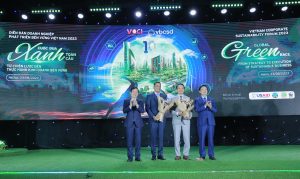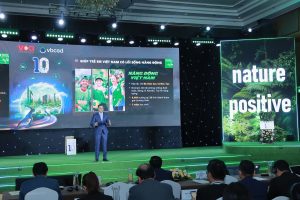At the Corporate Sustainability Forum (VCSF) organised by the Vietnam Chamber of Commerce and Industry (VCCI) and the Vietnam Business Council for Sustainable Development (VBCSD) on August 23, Deputy Prime Minister Tran Hong Ha emphasised, “Sustainability must be associated with inclusivity and the three pillars of sustainable economic development, sustainable social, cultural, and human development, and sustainable environmental development.”
“All businesses, regardless of their size and field, have the opportunity, position, potential, and promise to contribute to the current global green race,” added the DPM.

Binu Jacob, CEO of Nestlé Vietnam and co-chair of the VCBSD, said that innovation and sustainability need to go hand in hand to achieve business goals while addressing social and environmental issues.
“For decades, businesses have focused on total shareholder return, but for sustainable and long-term development, they not only need to create value for their shareholders but also have a positive societal impact,” Jacob said.
“Currently, investors are increasingly interested in firms that operate effectively while also positively impacting the environment and the surrounding society,” he added.
As a leading business in terms of sustainable development, Nestlé believes that creating value for society is the food group’s driving force.
In Vietnam, Nestlé is implementing many sustainable initiatives, with priorities including nutrition and physical development for children, sustainable procurement, climate change and water management, women’s empowerment, and sustainable packaging.
To contribute to encouraging a healthy lifestyle in the community, especially among children aged 6-17 years old, Nestlé MILO has implemented the Dynamic Vietnam programme.
The initiative aims to support localities with improved nutrition, while also providing sports equipment for schools and encouraging parents to create conditions for their children to enjoy physically active lifestyles.
To date, the drive has been deployed to nearly 8,500 schools in 36 provinces, gaining the participation of nearly 5 million children.

To fulfil its commitment to sustainable procurement, Nestlé has focused on sustainable coffee production under the Nescafé Plan in the Central Highlands provinces since 2011.
The programme has trained more than 330,000 people and allow more than 22,000 farmers to practice coffee production according to the 4C criteria.
Nescafé Plan has also contributed to helping farmers save 40 per cent of the water needed for irrigation, reduce fertiliser use by 20 per cent, and increase their income by 30-100 per cent by applying reasonable intercropping models.
When looking at social issues, enhancing the economic empowerment and status of women is an important part of Nestlé’s approach.
Since 2017, Nestlé Vietnam has cooperated with the Vietnam Women’s Union to implement the Nestlé Accompanies Women scheme in 20 provinces and cities nationwide, attracting 4,600 female members.
The initiative enhances nutritional knowledge for more than 1 million households across the country. It also helps to develop business skills, including digital transformation and the application of digital technology, among all members, allowing women to improve their incomes.
According to vice president of the VCCI and chairman of the VBCSD Nguyen Quang Vinh, businesses need to link their success and long-term growth with sustainable benefits for the community, society, and environment.
“As attitudes have changed, businesses need to focus on a number of priorities, such as transforming their value and supply chains in a more sustainable way, promoting accountability, and driving the dual transformation,” Vinh stated.
The VCSF is an important event that the VCCI and VBCSD have held annually since 2014, promoting dialogue on sustainability between the business community and the government.






